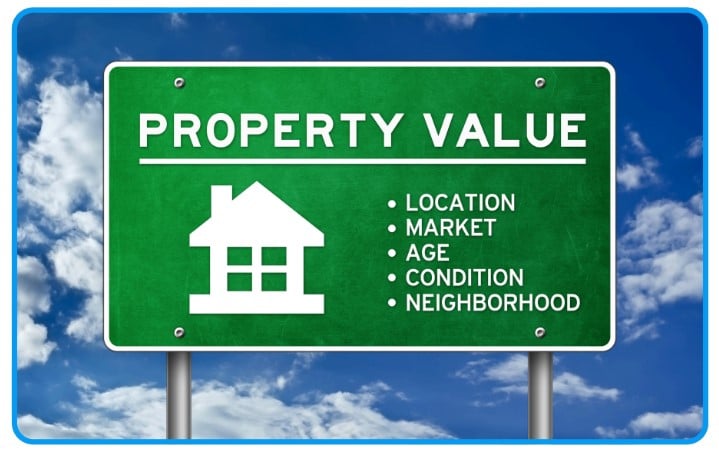Appraised Value vs Market Value
December 2024

What’s the difference between appraised value and market value? In short, appraised value is determined by a licensed appraiser based on a property’s features and comparable sales, while market value is the price a buyer is willing to pay in the current market.
Both values play a critical role in real estate but serve different purposes and can vary significantly.
Understanding the Fundamentals
Distinguishing Appraised Value from Market Value
At first glance, appraised value and market value might seem similar—they both describe what a property is
worth. However, their key differences lie in who determines the value and how it’s calculated.
- Appraised Value: Determined by a professional appraiser, this value is based on a detailed analysis of the property. Appraisers consider factors like square footage, condition, upgrades, and comparable sales in the area. The goal is to provide an unbiased, data-driven valuation for lenders or other stakeholders.
- Market Value: This value is shaped by the real estate market. It reflects what buyers are willing to pay for a home based on current demand, local trends, and even intangible factors like curb appeal or neighborhood desirability.

In simpler terms, appraised value is more about hard data, while market value leans on buyer sentiment and market trends.

Key Takeaway:
A bank appraisal safeguards the lender and buyer by ensuring the loan aligns with the property’s value.
The Role of Bank Appraisals
Bank appraisals are essential in real estate transactions involving financing. Lenders use appraisals to confirm that a property’s value supports the loan amount, minimizing their risk.
Here’s how it works:
- The lender hires a licensed appraiser to evaluate the property’s condition, features, and comparable sales.
- The appraised value helps determine how much the bank is willing to lend.
If the appraised value is lower than the sale price, it can disrupt the deal, requiring renegotiation or additional funds from the buyer.
The Impact of Tax Assessments on Appraised Value
Tax assessments determine your property taxes but don’t always align with appraised or market value. Local governments use formulas and mass appraisals rather than detailed evaluations, and assessments may not reflect current market conditions.
Key Takeaway:
Tax-assessed value can differ from appraised value, influencing taxes but not resale value or loan eligibility.
The Dynamics of Market Value
Market value is driven by the forces of supply and demand. Unlike appraised value, it reflects what a buyer is willing to pay for a property in the current market, which can fluctuate due to several factors.
What Influences Market Value?
- Buyer Demand: High demand can drive prices up, while low demand can decrease value.
- Market Conditions: Interest rates, economic trends, and seasonal shifts play a role.
- Perception: Features like curb appeal, location, and even staging can boost perceived value.
Key Takeaway:
Market value is fluid and shaped by buyer sentiment and real-time trends. Sellers and buyers alike should stay informed about local market dynamics to make confident decisions.
The Real Estate Appraisal Process Unveiled
Appraisers evaluate several key factors to arrive at a fair value for a property. These elements ensure the appraisal reflects the property’s true worth in its market context.
What Do Appraisers Look At?
- Property Features: Square footage, layout, age, and condition.
- Upgrades and Improvements: Renovations, energy-efficient systems, and updated features.
- Comparable Sales: Recent sales of similar properties in the same area.
- Location: Neighborhood amenities, school districts, and proximity to transportation.
- Market Conditions: Current supply and demand, interest rates, and economic trends.
How the Appraisal Process Works:
- Initial Inspection: The appraiser visits the property to assess its size, condition, upgrades, and overall features.
- Research: They gather data on recent comparable sales (comps) and market trends in the area.
- Analysis: Using a standardized approach, the appraiser calculates the property’s value based on objective data.
- Report: The findings are compiled into an official appraisal report used by the lender or client.
Key Takeaway:
Appraisals provide an unbiased, data-driven valuation, ensuring transparency and fairness in real estate transactions.
What Makes Real Estate Appraisals Unique?
- Licensed Professionals: Only certified appraisers can conduct formal appraisals.
- Data-Driven Approach: Appraisers rely on objective data, like recent sales, property features, and market trends.
- Purpose-Specific: Appraisals are tailored to the transaction’s purpose, such as lending, refinancing, or settling an estate.


Confronting Discrepancies
It’s not unusual for appraised value and market value to differ. These gaps can create challenges during real estate transactions but can be addressed with the right strategies.
When Appraised Value and Market Value Diverge
Appraised value is based on objective data, while market value reflects buyer sentiment and current trends. Discrepancies often occur when:
- Market Trends Shift Rapidly: Hot markets or declining markets can lead to mismatches between data-driven appraisals and buyer willingness to pay.
- Unique Features Impact Buyers, Not Appraisers: Trendy upgrades or personal preferences may boost market value but not appraised value.
Strategies to Bridge the Gap Between Appraised Value and Market Value
- For Sellers: Provide your appraiser with detailed records of upgrades and improvements to ensure they’re factored into the valuation.
- For Buyers: Use a low appraisal as a negotiation tool to adjust the purchase price or request seller concessions.
- For Realtors: Help clients understand the difference between the two values and guide them through pricing and negotiations effectively.

Enhancing Your Property’s Appraised Value
If you’re selling your home, you can take proactive steps to improve its appraised value.
- Focus on Maintenance: Address deferred maintenance issues like leaky faucets, peeling paint, or worn-out flooring.
- Upgrade Strategically: Invest in cost-effective upgrades that add value, like kitchen improvements or energy-efficient features.
- Enhance Curb Appeal: A well-maintained exterior can positively influence an appraiser’s perception of your home.
- Organize Documentation: Provide a list of recent upgrades, repairs, and their costs for the appraiser to consider.

The Seller's Perspective
Sellers must balance market value with buyer expectations. Pricing your home accurately and understanding how appraised value affects negotiations are key to a successful sale.
Determining Market Value: Advice for Sellers
Setting the right price starts with a Comparative Market Analysis (CMA), which evaluates recent sales of similar homes in your area.
- Use a CMA to set a competitive, realistic asking price.
- Compare homes similar in size, features, and location.
How Buyers Can Leverage Appraised Value in Negotiations
Buyers often use appraisals to negotiate when the appraised value is lower than the agreed price.
The Importance of an Appraisal Contingency
This clause protects buyers, allowing them to renegotiate, cancel, or request concessions if the appraisal falls short of the purchase price.
Key Takeaway for Sellers
Use a CMA to price your home competitively and prepare for appraisal-based negotiations to ensure a smoother sale.

The Buyer’s Journey
Buying a home involves balancing your budget with both appraised and market value. Understanding these factors can help you make informed decisions and avoid financial surprises.
Navigating Offers and Appraisals as a Buyer
To avoid complications:
- Work with your agent to research comparable sales and determine a fair offer price.
- Be cautious about overbidding in competitive markets unless you’re prepared to cover the gap if the appraisal is low.
Key Takeaway for Sellers
By aligning your offer with appraised and market value, you can protect your finances and navigate the buying process confidently.
Understanding the Financial Implications
Your financial plan should account for both what the home is worth and what a lender will finance.
Lenders base loan amounts on the appraised value, not the purchase price. To stay within budget:
- Factor in potential out-of-pocket costs if the appraisal is low.
- Ensure you have savings for your down payment, closing costs, and any appraisal- related shortfalls.
Navigating Your Real Estate Transaction with Confidence
Understanding appraised and market value is key to making informed real estate decisions.
Key Takeaways on Appraised Value vs. Market Value
- Appraised Value: A lender-focused, data-driven estimate.
- Market Value: What buyers are willing to pay, shaped by trends and demand.
- Discrepancies: Common but manageable through negotiation and planning.
Why Accurate Valuations Matter
Accurate valuations help you set expectations, negotiate effectively, and avoid financial pitfalls. Working with experts ensures you make confident decisions and achieve your real estate goals.

Appraisals in NC
At Triangle Appraisal Group, we know accurate home valuations are key to confident real estate decisions. Our team provides reliable, timely appraisals tailored to North Carolina’s real estate market.
Whether you’re buying, selling, or need expert advice, TAG is here to guide you every step of the way. Contact us today to make your real estate journey smoother and smarter!
FAQs
Not necessarily. Appraised value is determined by an appraiser based on objective data, while market value reflects what buyers are willing to pay. In hot markets, market value may exceed appraised value, but in slower markets, appraised value might be higher.
Not always. While appraised value provides a baseline, market value should guide your pricing. If buyer demand is strong, you might sell for more than the appraised value. Consult a real estate agent for pricing strategies based on current market conditions.
Market value is determined by analyzing recent comparable sales (comps), evaluating the property’s features, and factoring in current market trends. A real estate agent or appraiser can help provide an accurate estimate.
Not always. Appraisals often align closely with the selling price, but discrepancies can occur if the market is fluctuating, the home has unique features, or comparable sales are outdated.
Appraised value is based on objective data like comparable sales, property condition, and location, while market value reflects buyer sentiment and current trends. Discrepancies occur when the market moves faster than appraisal data or when buyers place higher value on unique property features.
- Sellers: If the appraisal is lower than expected, gather additional comps or invest in minor improvements to increase appeal.
- Buyers: Use a low appraisal to renegotiate the purchase price or request concessions from the seller.
- Both Parties: Consider ordering a second appraisal if discrepancies seem unjustified.
Work with experienced professionals, like real estate agents and appraisers, to ensure you understand the nuances of both values. Their expertise can help you confidently navigate pricing, negotiations, and financing.

